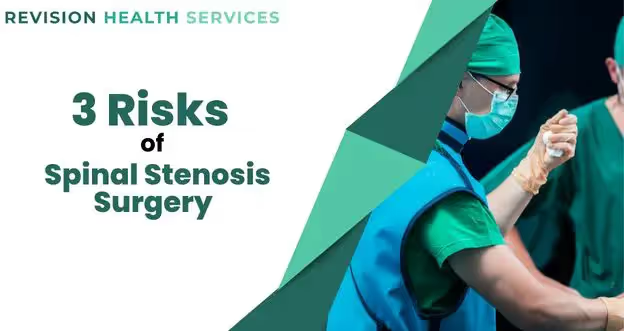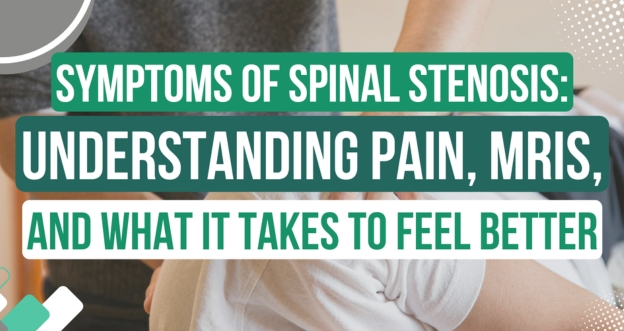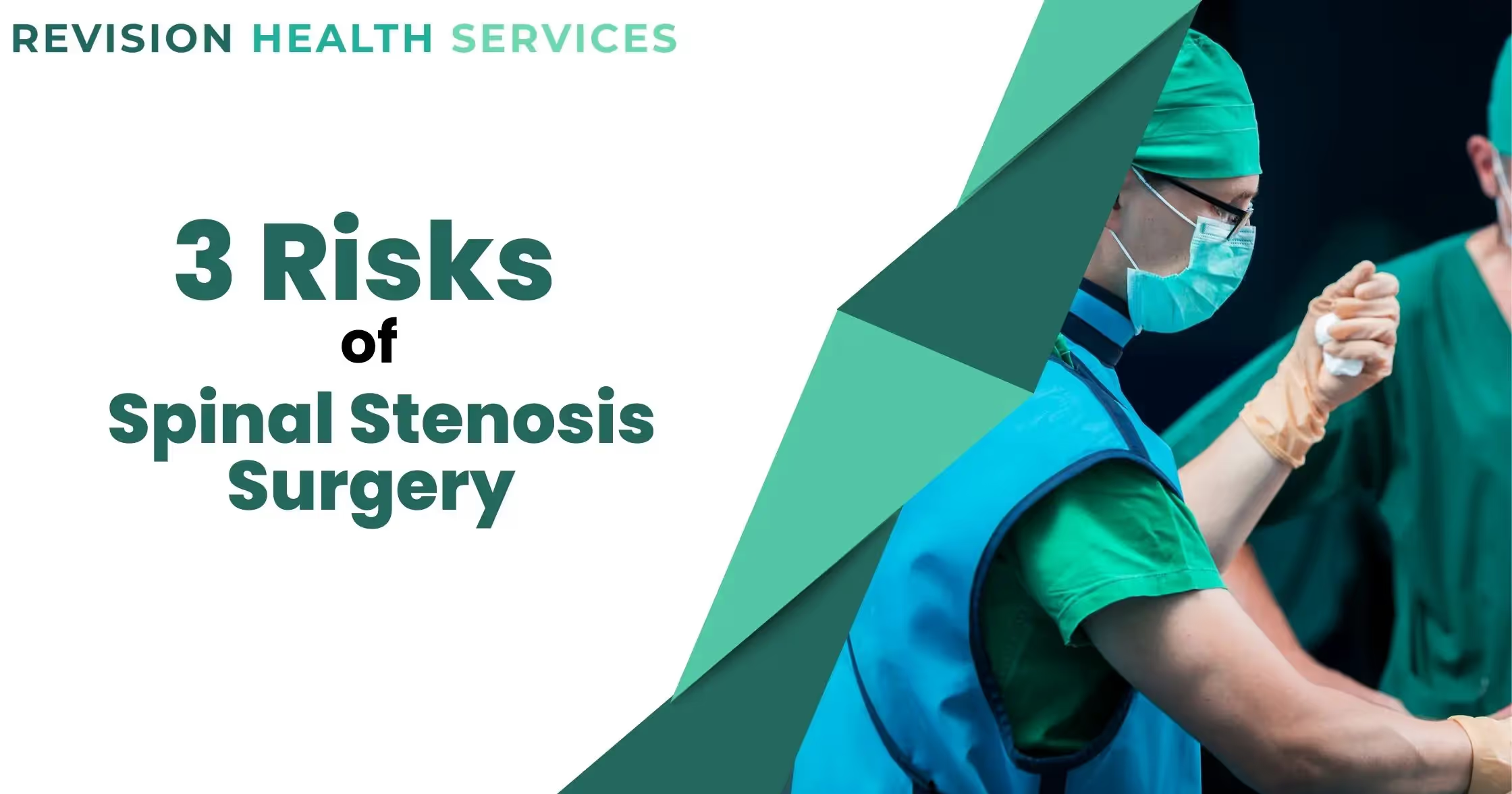
3 Very Real Spinal Stenosis Surgery Risks
Spinal stenosis affects about 11% of the adult population and diagnoses is often made when someone reports they have leg pain when they try to walk and have relief when they sit down. When I treat patients, the nerve pain in their legs and difficulty walking are the most common symptoms.
When conservative care such as physical therapy, which focuses on improving pain in the lower back or leg, doesn't work, surgery such as decompression or laminectomy may be appropriate. If you haven't tried a structured conservative approach yet, our Pain-Free Walking with Spinal Stenosis Program provides the exact exercises and progressions that help most stenosis patients avoid surgery. There are important things to consider before surgery and one of those are the risks related to spinal stenosis surgery.
I want to discuss the risks related to surgery that my patients wish they knew before hand.
Is Spinal Surgery Considered high Risk?
While every surgery has its risk, especially back spine surgery, the overall risk is associated with the type or procedure done. Most are now considered minimally invasive and I have seen may patients do well. Most spine surgeries are relatively low risk.
3 Spinal Surgery Risks I wish more People Knew Before They Had Spinal Stenosis Surgery
The overall risk for a severe complication related to spinal stenosis surgery is 3%. That risk does increase slightly in those who receive a fusion and those greater than 80 years old. This risk also increases in those who are diabetic, obese and have other co-morbidities such as heart conditions or in overall poor health.
Overall, spine surgery is risky but decompressions or laminectomies are often seen as low risk.
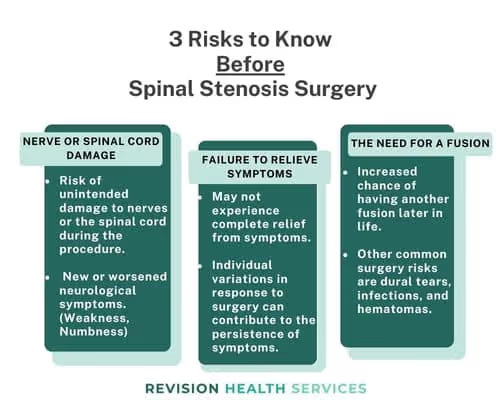
1. Nerve or Spinal Cord Damage
While the goal of spinal stenosis surgery is to relieve pressure on nerves, there is a risk of unintended damage to nerves or the spinal cord during the procedure. This risk can lead to new or worsened neurological symptoms.
2. Failure to Relieve Symptoms
Despite a successful surgical procedure, some patients may not experience complete relief from their symptoms. Factors such as the severity of stenosis, the presence of other spine conditions, or individual variations in response to surgery can contribute to the persistence of symptoms.
3. The Need For a Fusion
We know that those with a fusion are more likely to have greater complications and have an increased chance of having another fusion later in life.
Other common surgery risks are dural tears, infections, and hematomas.
What is the Success Rate of Surgery for Spinal Stenosis
The overall success rate for surgery for spinal stenosis is about 30%. That is complete resolution of symptoms, improved ability to walk and reduction in nerve pain. That said, nearly all have some sort of relief immediately, it just may not be 100%. It's important to modify your expectations based on what your physical therapists and surgeon discussed based on your body.
Every person is different and some have a lot of changes in their spine such as degeneration, and others may not.
Also, if you receive a one level decompression or laminectomy vs. a fusion that will also impact your recovery and success rate.
Success after surgery for spinal stenosis is variable. People have so many different types of pain and limitations before hand. What we see is that those with spinal stenosis, who are motivated, and take care of their body have better success.
Consider improving your strength and mobility prior to surgery with skilled physical therapy. I know its time consuming, costly, and hard but I have never seen a client regret feeling stronger and more mobile prior to surgery.
What to Expect Right Away After Spinal Stenosis Surgery
Right after spinal stenosis surgery, you can expect to feel better. And by better, I mean if you had severe leg pain, you should notice that your leg pain is reduced or even completely gone.
Sciatica type pain is very common with stenosis, and the most common cause to receive spinal stenosis surgery. That said, sciatica and spinal stenosis are different conditions.
I tell my clients that you can expect a reduction in leg pain, but the surgery may not impact your back pain. Often times people expect to have less back pain right away and that’s not the case.
While you will be moving and walking on the first day after surgery, you still have some recovery ahead of you.
With spinal stenosis surgery they remove bone, and while it is considered minimally invasive, you will still need to work on your back strength and mobility.
Walking is very important initially and then progress to resistance training.
The number one thing I would do after surgery is to schedule my physical therapy appointments. Your physical therapist will look at your back to understand what surgery you’ve had, and be able to help you progress towards your goals. Your surgeon may not recommend physical therapy, but trust me you want to regain as much range of motion as possible and improve your strength.
You have a lot of life ahead of you and a physical therapist on your side, will help you progress, faster, and more efficiently.
Factors Influencing the Success of Back Surgery for Spinal Stenosis:

- Severity of Spinal Stenosis: The more severe the stenosis, the more challenging it may be to achieve complete relief of symptoms.
- Type of Surgery: There are different surgical procedures for spinal stenosis, such as decompressive laminectomy, laminotomy, and spinal fusion. The choice of surgery depends on the specific characteristics of the condition and your spine.
- Overall Health of the Patient: The general health of the patient can impact the success of surgery and the recovery process. Health conditions such as diabetes, obesity, and cardiovascular issues can affect outcomes.
- Rehabilitation and Postoperative Care: Following surgery, rehabilitation plays a crucial role in recovery. Physical therapy and rehabilitation exercises are often recommended to help patients regain strength, flexibility, and functionality.
- Individual Variation: Every person's body responds differently to surgery. Factors such as genetics, pain tolerance, and individual healing processes can influence outcomes.
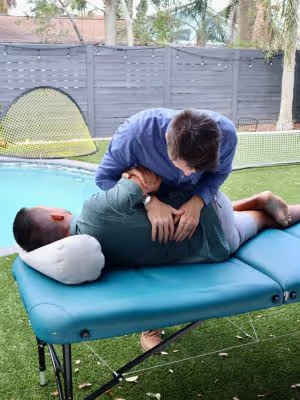
Is Surgery a Good Option for Spinal Stenosis?
Surgery can be a great option for spinal stenosis if you are an appropriate candidate. You want to make sure you are good candidate, but if you are many can expect immediate and long term relief.
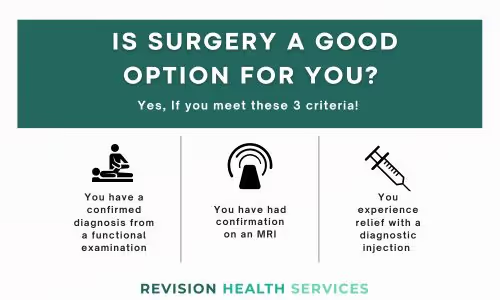
When you’re grappling with the discomfort of spinal stenosis, the decision to pursue spinal stenosis surgery can be a pivotal point in your journey towards pain relief. If you're considering surgery, it's vital to weigh how spinal stenosis surgery could help reduce spinal stenosis symptoms with your unique health profile in mind. Each case of spinal stenosis is as distinct as the spinal anatomy it affects. Whether surgery should be considered hinges on various factors, including the severity of your pain and the specific characteristics of the spinal issues at play. Entrusting your care to the expertise of a surgeon can be a formidable step in reclaiming your vitality. Let's explore 5 things you should consider before you choose spinal stenosis surgery.
5 Important Considerations Prior to Spinal Stenosis Surgery

1. Do you actually have spinal stenosis?
Spinal stenosis is a reduction of space in your spine. The most common symptoms being leg pain when walking. You may feel back pain from this diagnosis as well.
What is important to consider is that you may have spinal stenosis based on a diagnostic image, like an MRI, but what we really want to know is how are you functioning in your day to day?
Our free Pain While Walking Quiz can help you determine if your symptoms align with stenosis patterns - and whether conservative care might work for you before considering surgery.
I see so many clients with "stenosis" without any pain or limitation.
This is important before you choose invasive treatments like surgery. You can fix spinal stenosis without surgery. Physical therapy is the ideal and evidence supported starting point for if you are looking for spinal stenosis relief. You always want to start conservative.
2. What do Injections do?
Injections can be used as a diagnostic tool to understand where exactly your spinal stenosis is. The physician will do the injection right at the nerve they think is causing you pain. If you feel relief from the leg pain, it might be a good indicator that surgery might be a good option for you! Many times this is a sure fire way to determine if you are a good candidate for spinal stenosis surgery.
3. What to do before and after spinal stenosis surgery?
Before surgery, it is imperative to establish a relationship with a physical therapist. Ideally, you should try to see them for several weeks before surgery to strengthen your muscles before you undergo the procedure. This is to ensure that you already have a good foundation to come back to after your surgery. After surgery, you should reach back out to the physical therapist you were seeing before and continue working with them to continue building muscle and gaining resiliency!
4. What are the risks to spinal stenosis surgery?
With any surgery, there are risks involved. One of the main risks with spinal stenosis surgery is that you could increase your likelihood of having more surgeries in the future. It is important that you know the statistics on this before you choose to go through with surgery because we obviously do not want you to have more procedures than you need. Although it is a lower risk surgery, there is still a chance you may have to go through it again just to get more relief.
5. Does spinal stenosis surgery work?
Spinal stenosis absolutely works for the right person! If you have thought through all of the above considerations and thought "Yes! That is me!" then you are likely a good candidate for spinal stenosis surgery. And I have seen many success stories from these procedures. One thing that I notice a lot in my clients when I visit them after their surgery is the first time they stand up, they have immediate relief from their leg pain.
Another thing that is surprising for my clients is how quickly they are able to get up and start walking again. Spinal stenosis surgery works, just make sure its right for you!
That said, surgery often doesn't improve back pain because the major goal of spine surgery is to protect your nerves. Stenosis means the space around your nerve is decreasing so the goal is to decompress the nerve, or relieve pressure around it.
You will want to have a plan to improve your lower back flexibility after surgery.
What is the Recovery Time for Spinal Stenosis Surgery?
For those with spinal stenosis surgery they should expect about a 6-8 week recovery time frame. Many have relief in symptoms right away and others take a little longer. You have to remember no spine is the same and every recovery is different. It also depends on if you receive a fusion, simple decompression, or a multi-level decompression.
This is what I would do to make sure I have the best recovery possible.
In conclusion, spinal stenosis surgery, though not without risks, offers significant benefits for many. While most procedures, particularly decompressions or laminectomies, are generally considered low-risk, patients should be aware of potential complications.
The decision to pursue surgery, especially with the potential need for fusion, should be informed by factors such as age, health conditions, and lifestyle. Despite a 30% overall success rate, surgery can be effective, particularly when the diagnosis is confirmed, and postoperative care, including tailored physical therapy.
How to Choose the Right Clinic for Your Spinal Stenosis Surgery
When considering surgery for lumbar spinal stenosis, selecting the right clinic is crucial for your health and the spine's well-being. Ensure the clinic's spine surgeon is experienced in surgical treatments specific to lumbar spinal stenosis. Communicate openly with your primary provider about the implications of surgical versus non-surgical approaches. Look for a clinic that integrates surgical expertise with a holistic understanding of health, considering your spine's unique needs. Always choose a clinic that resonates with your health expectations, emphasizes pain relief, and has a reputable spine surgeon aligned with your healing journey.
FAQs
What is lumbar spinal stenosis, and how can Revision Health Services help?
Lumbar spinal stenosis is a condition where the spinal canal in your lumbar region narrows, causing discomfort and limiting mobility. At Revision Health Services, we offer a range of treatments, both conservative and surgical, to help alleviate your pain and improve mobility. Our team of dedicated professionals is committed to understanding your specific needs and guiding you through personalized care plans to enhance your well-being.
Can physical therapy effectively treat lumbar spinal stenosis?
Absolutely! Physical therapy is a potent non-surgical treatment option for managing lumbar spinal stenosis. The specialized physical therapists at Revision Health Services can help you strengthen your spine and alleviate back pain with targeted exercises and stretches crafted to your individual condition, often reducing the need for surgery.
Is spinal stenosis surgery necessary for everyone suffering from this condition?
Not necessarily. The necessity of surgery for spinal stenosis varies based on the severity of symptoms and individual health profiles. At Revision Health Services, we explore all treatment avenues, considering non-surgical options like physical therapy as viable alternatives. Surgery is typically recommended only when conservative measures fail to provide significant relief.
What does spinal stenosis surgery entail, and what are my options at Revision Health Services?
Spinal stenosis surgery, such as a laminectomy, involves removing a portion of the bone that is compressing the spinal nerves to relieve pain. At Revision Health Services, we discuss and consider both traditional and minimally invasive surgical options, always aiming for the quickest recovery and best outcome tailored to your needs and health goals.
How do I decide between surgical and non-surgical treatments at Revision Health Services?
Decision-making for treating lumbar spinal stenosis involves a thorough evaluation of your condition and a comprehensive discussion with our spine specialists. We at Revision Health Services ensure that you are fully informed about the pros and cons of all your options, weighing the effectiveness of physical therapy (non-surgical treatments) against the potential benefits of surgery for your unique spine health and lifestyle. Together, we will tailor a plan that prioritizes your well-being and provides you with the support needed every step of the way. Remember, Revision Health Services is here to support and guide you through your journey to a pain-free, active life. Our goal is to help you regain control and improve your quality of life with the best possible care for your spine health.
References:
Spinal stenosis affects about 11% of the adult population and diagnoses is often made when someone reports they have leg pain when they try to walk and have relief when they sit down. When I treat patients, the nerve pain in their legs and difficulty walking are the most common symptoms.
When conservative care such as physical therapy, which focuses on improving pain in the lower back or leg, doesn't work, surgery such as decompression or laminectomy may be appropriate. If you haven't tried a structured conservative approach yet, our Pain-Free Walking with Spinal Stenosis Program provides the exact exercises and progressions that help most stenosis patients avoid surgery. There are important things to consider before surgery and one of those are the risks related to spinal stenosis surgery.
I want to discuss the risks related to surgery that my patients wish they knew before hand.
Is Spinal Surgery Considered high Risk?
While every surgery has its risk, especially back spine surgery, the overall risk is associated with the type or procedure done. Most are now considered minimally invasive and I have seen may patients do well. Most spine surgeries are relatively low risk.
3 Spinal Surgery Risks I wish more People Knew Before They Had Spinal Stenosis Surgery
The overall risk for a severe complication related to spinal stenosis surgery is 3%. That risk does increase slightly in those who receive a fusion and those greater than 80 years old. This risk also increases in those who are diabetic, obese and have other co-morbidities such as heart conditions or in overall poor health.
Overall, spine surgery is risky but decompressions or laminectomies are often seen as low risk.

1. Nerve or Spinal Cord Damage
While the goal of spinal stenosis surgery is to relieve pressure on nerves, there is a risk of unintended damage to nerves or the spinal cord during the procedure. This risk can lead to new or worsened neurological symptoms.
2. Failure to Relieve Symptoms
Despite a successful surgical procedure, some patients may not experience complete relief from their symptoms. Factors such as the severity of stenosis, the presence of other spine conditions, or individual variations in response to surgery can contribute to the persistence of symptoms.
3. The Need For a Fusion
We know that those with a fusion are more likely to have greater complications and have an increased chance of having another fusion later in life.
Other common surgery risks are dural tears, infections, and hematomas.
What is the Success Rate of Surgery for Spinal Stenosis
The overall success rate for surgery for spinal stenosis is about 30%. That is complete resolution of symptoms, improved ability to walk and reduction in nerve pain. That said, nearly all have some sort of relief immediately, it just may not be 100%. It's important to modify your expectations based on what your physical therapists and surgeon discussed based on your body.
Every person is different and some have a lot of changes in their spine such as degeneration, and others may not.
Also, if you receive a one level decompression or laminectomy vs. a fusion that will also impact your recovery and success rate.
Success after surgery for spinal stenosis is variable. People have so many different types of pain and limitations before hand. What we see is that those with spinal stenosis, who are motivated, and take care of their body have better success.
Consider improving your strength and mobility prior to surgery with skilled physical therapy. I know its time consuming, costly, and hard but I have never seen a client regret feeling stronger and more mobile prior to surgery.
What to Expect Right Away After Spinal Stenosis Surgery
Right after spinal stenosis surgery, you can expect to feel better. And by better, I mean if you had severe leg pain, you should notice that your leg pain is reduced or even completely gone.
Sciatica type pain is very common with stenosis, and the most common cause to receive spinal stenosis surgery. That said, sciatica and spinal stenosis are different conditions.
I tell my clients that you can expect a reduction in leg pain, but the surgery may not impact your back pain. Often times people expect to have less back pain right away and that’s not the case.
While you will be moving and walking on the first day after surgery, you still have some recovery ahead of you.
With spinal stenosis surgery they remove bone, and while it is considered minimally invasive, you will still need to work on your back strength and mobility.
Walking is very important initially and then progress to resistance training.
The number one thing I would do after surgery is to schedule my physical therapy appointments. Your physical therapist will look at your back to understand what surgery you’ve had, and be able to help you progress towards your goals. Your surgeon may not recommend physical therapy, but trust me you want to regain as much range of motion as possible and improve your strength.
You have a lot of life ahead of you and a physical therapist on your side, will help you progress, faster, and more efficiently.
Factors Influencing the Success of Back Surgery for Spinal Stenosis:

- Severity of Spinal Stenosis: The more severe the stenosis, the more challenging it may be to achieve complete relief of symptoms.
- Type of Surgery: There are different surgical procedures for spinal stenosis, such as decompressive laminectomy, laminotomy, and spinal fusion. The choice of surgery depends on the specific characteristics of the condition and your spine.
- Overall Health of the Patient: The general health of the patient can impact the success of surgery and the recovery process. Health conditions such as diabetes, obesity, and cardiovascular issues can affect outcomes.
- Rehabilitation and Postoperative Care: Following surgery, rehabilitation plays a crucial role in recovery. Physical therapy and rehabilitation exercises are often recommended to help patients regain strength, flexibility, and functionality.
- Individual Variation: Every person's body responds differently to surgery. Factors such as genetics, pain tolerance, and individual healing processes can influence outcomes.

Is Surgery a Good Option for Spinal Stenosis?
Surgery can be a great option for spinal stenosis if you are an appropriate candidate. You want to make sure you are good candidate, but if you are many can expect immediate and long term relief.

When you’re grappling with the discomfort of spinal stenosis, the decision to pursue spinal stenosis surgery can be a pivotal point in your journey towards pain relief. If you're considering surgery, it's vital to weigh how spinal stenosis surgery could help reduce spinal stenosis symptoms with your unique health profile in mind. Each case of spinal stenosis is as distinct as the spinal anatomy it affects. Whether surgery should be considered hinges on various factors, including the severity of your pain and the specific characteristics of the spinal issues at play. Entrusting your care to the expertise of a surgeon can be a formidable step in reclaiming your vitality. Let's explore 5 things you should consider before you choose spinal stenosis surgery.
5 Important Considerations Prior to Spinal Stenosis Surgery

1. Do you actually have spinal stenosis?
Spinal stenosis is a reduction of space in your spine. The most common symptoms being leg pain when walking. You may feel back pain from this diagnosis as well.
What is important to consider is that you may have spinal stenosis based on a diagnostic image, like an MRI, but what we really want to know is how are you functioning in your day to day?
Our free Pain While Walking Quiz can help you determine if your symptoms align with stenosis patterns - and whether conservative care might work for you before considering surgery.
I see so many clients with "stenosis" without any pain or limitation.
This is important before you choose invasive treatments like surgery. You can fix spinal stenosis without surgery. Physical therapy is the ideal and evidence supported starting point for if you are looking for spinal stenosis relief. You always want to start conservative.
2. What do Injections do?
Injections can be used as a diagnostic tool to understand where exactly your spinal stenosis is. The physician will do the injection right at the nerve they think is causing you pain. If you feel relief from the leg pain, it might be a good indicator that surgery might be a good option for you! Many times this is a sure fire way to determine if you are a good candidate for spinal stenosis surgery.
3. What to do before and after spinal stenosis surgery?
Before surgery, it is imperative to establish a relationship with a physical therapist. Ideally, you should try to see them for several weeks before surgery to strengthen your muscles before you undergo the procedure. This is to ensure that you already have a good foundation to come back to after your surgery. After surgery, you should reach back out to the physical therapist you were seeing before and continue working with them to continue building muscle and gaining resiliency!
4. What are the risks to spinal stenosis surgery?
With any surgery, there are risks involved. One of the main risks with spinal stenosis surgery is that you could increase your likelihood of having more surgeries in the future. It is important that you know the statistics on this before you choose to go through with surgery because we obviously do not want you to have more procedures than you need. Although it is a lower risk surgery, there is still a chance you may have to go through it again just to get more relief.
5. Does spinal stenosis surgery work?
Spinal stenosis absolutely works for the right person! If you have thought through all of the above considerations and thought "Yes! That is me!" then you are likely a good candidate for spinal stenosis surgery. And I have seen many success stories from these procedures. One thing that I notice a lot in my clients when I visit them after their surgery is the first time they stand up, they have immediate relief from their leg pain.
Another thing that is surprising for my clients is how quickly they are able to get up and start walking again. Spinal stenosis surgery works, just make sure its right for you!
That said, surgery often doesn't improve back pain because the major goal of spine surgery is to protect your nerves. Stenosis means the space around your nerve is decreasing so the goal is to decompress the nerve, or relieve pressure around it.
You will want to have a plan to improve your lower back flexibility after surgery.
What is the Recovery Time for Spinal Stenosis Surgery?
For those with spinal stenosis surgery they should expect about a 6-8 week recovery time frame. Many have relief in symptoms right away and others take a little longer. You have to remember no spine is the same and every recovery is different. It also depends on if you receive a fusion, simple decompression, or a multi-level decompression.
This is what I would do to make sure I have the best recovery possible.
In conclusion, spinal stenosis surgery, though not without risks, offers significant benefits for many. While most procedures, particularly decompressions or laminectomies, are generally considered low-risk, patients should be aware of potential complications.
The decision to pursue surgery, especially with the potential need for fusion, should be informed by factors such as age, health conditions, and lifestyle. Despite a 30% overall success rate, surgery can be effective, particularly when the diagnosis is confirmed, and postoperative care, including tailored physical therapy.
How to Choose the Right Clinic for Your Spinal Stenosis Surgery
When considering surgery for lumbar spinal stenosis, selecting the right clinic is crucial for your health and the spine's well-being. Ensure the clinic's spine surgeon is experienced in surgical treatments specific to lumbar spinal stenosis. Communicate openly with your primary provider about the implications of surgical versus non-surgical approaches. Look for a clinic that integrates surgical expertise with a holistic understanding of health, considering your spine's unique needs. Always choose a clinic that resonates with your health expectations, emphasizes pain relief, and has a reputable spine surgeon aligned with your healing journey.
FAQs
What is lumbar spinal stenosis, and how can Revision Health Services help?
Lumbar spinal stenosis is a condition where the spinal canal in your lumbar region narrows, causing discomfort and limiting mobility. At Revision Health Services, we offer a range of treatments, both conservative and surgical, to help alleviate your pain and improve mobility. Our team of dedicated professionals is committed to understanding your specific needs and guiding you through personalized care plans to enhance your well-being.
Can physical therapy effectively treat lumbar spinal stenosis?
Absolutely! Physical therapy is a potent non-surgical treatment option for managing lumbar spinal stenosis. The specialized physical therapists at Revision Health Services can help you strengthen your spine and alleviate back pain with targeted exercises and stretches crafted to your individual condition, often reducing the need for surgery.
Is spinal stenosis surgery necessary for everyone suffering from this condition?
Not necessarily. The necessity of surgery for spinal stenosis varies based on the severity of symptoms and individual health profiles. At Revision Health Services, we explore all treatment avenues, considering non-surgical options like physical therapy as viable alternatives. Surgery is typically recommended only when conservative measures fail to provide significant relief.
What does spinal stenosis surgery entail, and what are my options at Revision Health Services?
Spinal stenosis surgery, such as a laminectomy, involves removing a portion of the bone that is compressing the spinal nerves to relieve pain. At Revision Health Services, we discuss and consider both traditional and minimally invasive surgical options, always aiming for the quickest recovery and best outcome tailored to your needs and health goals.
How do I decide between surgical and non-surgical treatments at Revision Health Services?
Decision-making for treating lumbar spinal stenosis involves a thorough evaluation of your condition and a comprehensive discussion with our spine specialists. We at Revision Health Services ensure that you are fully informed about the pros and cons of all your options, weighing the effectiveness of physical therapy (non-surgical treatments) against the potential benefits of surgery for your unique spine health and lifestyle. Together, we will tailor a plan that prioritizes your well-being and provides you with the support needed every step of the way. Remember, Revision Health Services is here to support and guide you through your journey to a pain-free, active life. Our goal is to help you regain control and improve your quality of life with the best possible care for your spine health.
